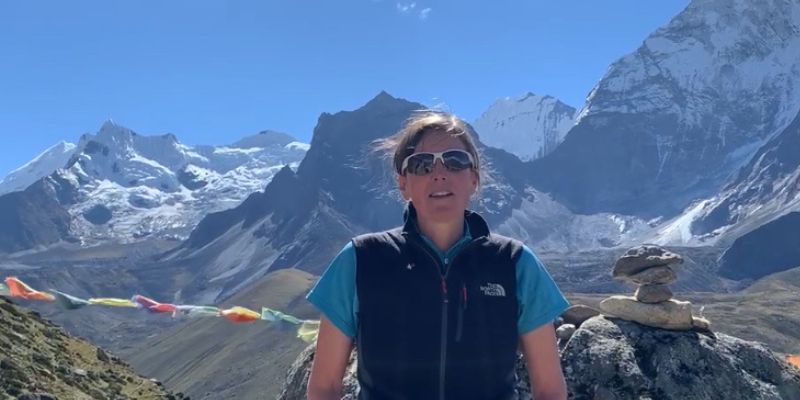
A cancer and exercise researcher at the University of Leeds is set to run the Everest Marathon in May, just over a year on from her incurable breast cancer diagnosis.
After dedicating her career to researching how exercise can be used in cancer treatment, Dr Shaunna Burke was diagnosed with incurable, stage four breast cancer in 2024.
Dr Burke, who is an Associate Professor in Exercise and Health Psychology at the University of Leeds, designed a targeted diet and exercise plan to enhance the effectiveness of her treatments, which involved running to and from her chemotherapy and radiotherapy appointments.
Now, she is preparing to run her first-ever marathon on Mount Everest and climb a 6000-meter peak in May in aid of Macmillan Cancer Support.
Staying active helped me to tolerate my treatment – I experienced few side effects, and it also helped me psychologically.
Dr Burke, who lives in Ilkley, said: “I was scheduled to do the Everest Marathon last year, but everything was put on hold as my life was disrupted in ways I never imagined with the diagnosis. My liver surgeon encouraged me to keep planning – to keep looking ahead, so I deferred my race entry to this year, and that decision gave me something to hold onto. It kept me going throughout my treatments.
“Each time I had treatment, I ran from my house to the chemotherapy bus and parked my car further away from St James’s Hospital so I could run 3 miles to radiotherapy. Staying active helped me to tolerate my treatment – I experienced few side effects, and it also helped me psychologically. The endorphin release gave me a much-needed boost and being in nature reminded me of life beyond the hospital walls. Although it felt surreal to be applying learnings from my research on prehabilitation to my own life, it gave me proof that I could still be fit and strong.”
Her treatment involved four and a half months of chemotherapy, a double mastectomy, liver surgery, and 3 weeks of radiotherapy – delivered by Airedale Hospital and the Leeds Cancer Centre at St James’s Hospital, where Dr Burke saw the familiar faces of research colleagues in the radiotherapy wing. She is now taking maintenance therapy medication to control the cancer.
As a researcher in the School of Biomedical Sciences at Leeds, Dr Burke’s work focuses on prehabilitation and rehabilitation strategies designed to support patients before, during and after cancer treatment. This involves enhancing patients’ fitness levels both before and after surgery, enabling their bodies to better withstand the physical demands of treatment.
When asked how her diagnosis changed her perspective on her research, she said: “I thought I understood the participants in my research and what they were living through, but I didn’t. Now I completely understand.
“Moving forward, I would like to research new areas. Prehabilitation primarily focuses on getting patients fit for surgery, and the conversation tends to stop there. But what happens when patients face prolonged and multiple surgeries or treatments? This requires tailored support and a deep understanding of individual needs, so patients can maintain healthy lifestyles and preserve strength, function, and overall well-being throughout their treatments and beyond.”
Dr Burke’s projects, which have been supported by funders including Macmillan, Yorkshire Cancer Research and Cancer Research UK, have shown that people should keep as active as possible before and during treatment to aid recovery.
“Shaunna is so dedicated to this challenge and wish her all the very best of luck. Shaunna – thank you so much for supporting Macmillan.”
Relationship Fundraising Lead for Macmillan, Lisa Martin, said: “This is a monumental challenge and we are behind Shaunna all the way! We are so grateful that she has decided to donate the money raised to Macmillan, as whatever she raises will go a long way in providing vital support for people living with cancer.
“Shaunna is so dedicated to this challenge and wish her all the very best of luck. Shaunna – thank you so much for supporting Macmillan.”
Dr Burke became the second Canadian woman to summit Everest in 2005 and since then, she has also researched the psychology of mountaineering, and the preparation needed for a huge climb like Everest.
The race, which is the highest marathon in the world, starts at 5356m high on Everest and finishes at 3446m. Because of the high altitude, Dr Burke will need several days to acclimatize before the run. She has been preparing by doing altitude training here in Leeds to get ready for the immense challenge.
While in Nepal, Dr Burke will also be exploring potential research collaborations in the region with local communities to help them access pre- and re-habilitation remotely through telemedicine.
You can follow Dr Burke’s Everest Marathon journey on Instagram and donate on her JustGiving page.
Further information
For more information, please contact the Univeristy of Leeds press office on pressoffice@leeds.ac.uk
Photo provided at the courtesy of Dr Shaunna Burke.